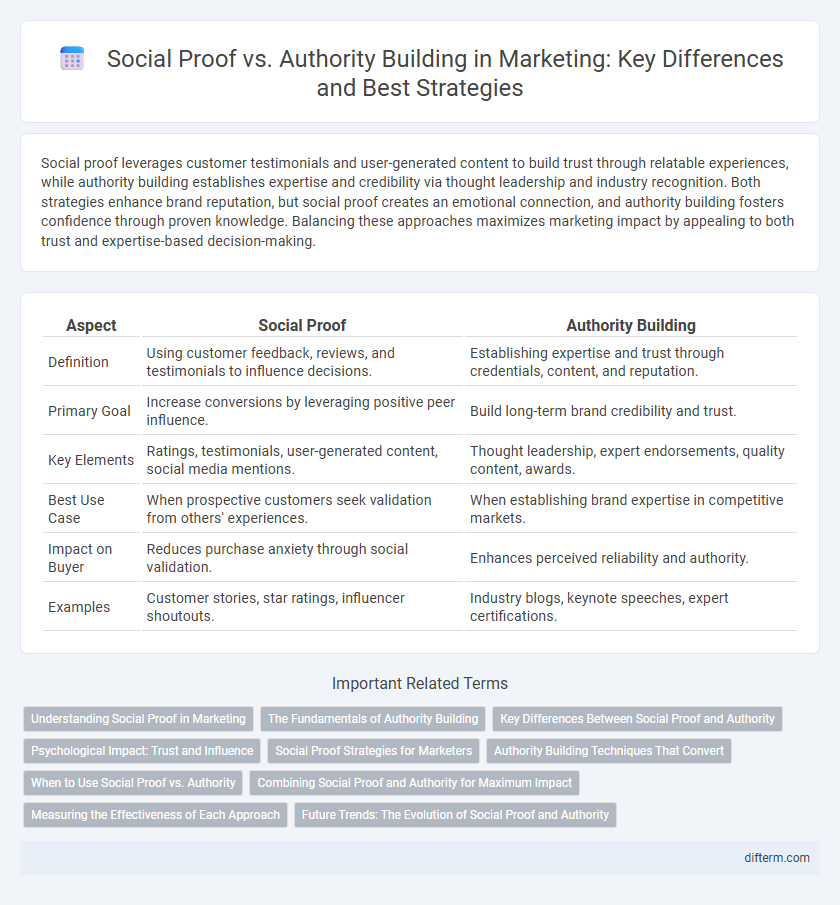Social proof leverages customer testimonials and user-generated content to build trust through relatable experiences, while authority building establishes expertise and credibility via thought leadership and industry recognition. Both strategies enhance brand reputation, but social proof creates an emotional connection, and authority building fosters confidence through proven knowledge. Balancing these approaches maximizes marketing impact by appealing to both trust and expertise-based decision-making.
Table of Comparison
| Aspect | Social Proof | Authority Building |
|---|---|---|
| Definition | Using customer feedback, reviews, and testimonials to influence decisions. | Establishing expertise and trust through credentials, content, and reputation. |
| Primary Goal | Increase conversions by leveraging positive peer influence. | Build long-term brand credibility and trust. |
| Key Elements | Ratings, testimonials, user-generated content, social media mentions. | Thought leadership, expert endorsements, quality content, awards. |
| Best Use Case | When prospective customers seek validation from others' experiences. | When establishing brand expertise in competitive markets. |
| Impact on Buyer | Reduces purchase anxiety through social validation. | Enhances perceived reliability and authority. |
| Examples | Customer stories, star ratings, influencer shoutouts. | Industry blogs, keynote speeches, expert certifications. |
Understanding Social Proof in Marketing
Social proof in marketing leverages consumer behavior and psychology by showcasing testimonials, reviews, and user-generated content to build trust and credibility. It influences potential customers by demonstrating that others have had positive experiences, thereby reducing uncertainty and increasing conversion rates. Effective social proof integrates authentic customer feedback with visible social endorsements, enhancing brand reputation and encouraging decision-making.
The Fundamentals of Authority Building
Authority building in marketing centers on establishing credibility through expertise, trustworthiness, and consistent value delivery. Key fundamentals include showcasing industry knowledge, leveraging testimonials from reputable sources, and maintaining a professional brand presence. Effective authority building enhances customer confidence and drives long-term engagement by positioning the brand as a leader in its niche.
Key Differences Between Social Proof and Authority
Social proof leverages testimonials, reviews, and user-generated content to influence potential customers by showcasing real experiences, whereas authority building relies on expert endorsements, certifications, and thought leadership to establish credibility and trust. Social proof emphasizes community validation and peer influence, while authority centers on recognized expertise and professional status. Both strategies enhance brand trust but target different psychological triggers in the decision-making process.
Psychological Impact: Trust and Influence
Social proof leverages the psychological impact of conformity, where potential customers trust a product or service because others have positively endorsed it, fostering a sense of community validation. Authority building relies on expert credibility to influence audiences, utilizing authoritative figures or certifications to establish trustworthiness and reduce decision-making anxiety. Both strategies enhance trust and influence but cater to different psychological triggers--social proof appeals to peer validation, while authority appeals to expertise and reliability.
Social Proof Strategies for Marketers
Social proof strategies leverage customer reviews, testimonials, and user-generated content to build trust and influence purchase decisions effectively. Marketers utilize social proof by showcasing verified ratings, influencer endorsements, and real-time usage statistics to enhance brand credibility and engagement. Implementing social proof increases conversion rates by validating product quality through peer experiences rather than solely relying on authoritative claims.
Authority Building Techniques That Convert
Authority building techniques that convert include consistently publishing expert content, leveraging industry certifications, and showcasing client success stories to establish credibility. Utilizing thought leadership through webinars, keynote speeches, and bylined articles positions brands as trusted experts, enhancing customer trust and driving conversions. Strategic partnerships with recognized industry influencers further amplify authority and foster consumer confidence.
When to Use Social Proof vs. Authority
Social proof is most effective when targeting consumer trust and encouraging immediate action by showcasing testimonials, reviews, or user-generated content from satisfied customers. Authority building works best in establishing long-term credibility and expertise by highlighting endorsements from industry experts, certifications, or media recognition. Use social proof for conversion-driven campaigns and authority building for brand positioning and thought leadership.
Combining Social Proof and Authority for Maximum Impact
Harnessing social proof alongside authority building amplifies brand credibility by leveraging authentic customer testimonials and expert endorsements. Integrating user-generated content with influential thought leader partnerships enhances trust and drives higher conversion rates. This combined strategy maximizes consumer confidence and reinforces brand authority in competitive markets.
Measuring the Effectiveness of Each Approach
Measuring the effectiveness of social proof versus authority building involves analyzing key metrics such as conversion rates, engagement levels, and customer trust scores. Social proof can be quantified through user-generated content impact and referral rates, while authority building effectiveness is gauged by influencer reach, domain authority, and content credibility. Leveraging A/B testing combined with sentiment analysis provides granular insights into which approach drives higher customer acquisition and retention.
Future Trends: The Evolution of Social Proof and Authority
Social proof is evolving through AI-driven customer reviews and influencer marketing platforms that amplify authentic user experiences, while authority building leverages thought leadership content powered by data analytics and personalized expert endorsements. Future trends highlight the integration of blockchain for transparent social proof verification and the rise of micro-authorities niche-specific leaders who drive targeted brand trust. Marketers must adapt by combining real-time customer interaction data with authoritative insights to shape credible, scalable brand narratives.
Social Proof vs Authority Building Infographic

 difterm.com
difterm.com